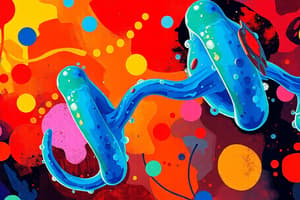Podcast
Questions and Answers
What are the main events regulated by complex signaling pathways in cellular processes?
What are the main events regulated by complex signaling pathways in cellular processes?
- Cell division, differentiation, migration, and apoptosis (correct)
- Cell adhesion, cell communication, cell metabolism, and cell transport
- Cellular respiration, cell signaling, cell defense, and cell repair
- Cell growth, DNA replication, protein synthesis, and energy production
Which type of nanoparticles have found applications in biochemistry for studying cellular processes and developing therapies?
Which type of nanoparticles have found applications in biochemistry for studying cellular processes and developing therapies?
- Quantum dots or nanowires
- Magnetic or fluorescent nanoparticles (correct)
- Polymeric or metallic nanoparticles
- Carbon-based or silicon nanoparticles
What unique characteristics are associated with Gram-negative bacteria due to their cell wall structure?
What unique characteristics are associated with Gram-negative bacteria due to their cell wall structure?
- Inability to cause infections and lack of cell wall structure
- Resistance to some antibiotics and production of endotoxins (correct)
- High sensitivity to antibiotics and lack of toxic components
- Aerobic growth and low pathogenicity
What type of molecules are involved in regulating cellular processes along with proteins and enzymes?
What type of molecules are involved in regulating cellular processes along with proteins and enzymes?
How do nanoparticles with magnetic or fluorescent properties contribute to biochemistry?
How do nanoparticles with magnetic or fluorescent properties contribute to biochemistry?
What is the primary function of enzymes in living organisms?
What is the primary function of enzymes in living organisms?
Which biological molecule is responsible for catalyzing reactions in living organisms?
Which biological molecule is responsible for catalyzing reactions in living organisms?
What is the role of nucleic acids in cellular processes?
What is the role of nucleic acids in cellular processes?
Which of the following processes is NOT involved in metabolism?
Which of the following processes is NOT involved in metabolism?
Gram-negative bacteria are known for their unique:
Gram-negative bacteria are known for their unique:
Flashcards are hidden until you start studying
Study Notes
Unraveling Biochemistry: Metabolism, Enzymes, Proteins, Nucleic Acids, Cellular Processes, Nanoparticles, and Gram-negative Bacteria
Biochemistry is an interdisciplinary science that delves into the chemical processes within living organisms. It encompasses metabolism, enzymes, proteins, nucleic acids, cellular processes, and the cutting-edge applications of nanoparticles in modern biology, along with the unique characteristics of Gram-negative bacteria.
Metabolism
Metabolism is the sum of all biochemical processes that occur within living organisms to maintain life, grow, and reproduce. It comprises catabolic reactions that break down molecules to release energy, as well as anabolic processes that construct more complex molecules.
Enzymes
Enzymes are biological catalysts that speed up biochemical reactions without being consumed in the process. They play a vital role in metabolism and are responsible for the activity of cells.
Proteins
Proteins are complex molecules composed of amino acids that serve various functions, such as catalyzing reactions (enzymes), providing structural support, and acting as signaling agents.
Nucleic Acids
Nucleic acids, including DNA and RNA, store and transmit genetic information. They are essential components of genetic material and cellular processes, such as replication, transcription, and translation.
Cellular Processes
Cellular processes include essential events such as cell division, differentiation, migration, and apoptosis, which are regulated by complex signaling pathways involving proteins, enzymes, and nucleic acids.
Nanoparticles
Nanoparticles, especially those with magnetic or fluorescent properties, have found applications in biochemistry to study cellular processes, analyze biomolecules, and develop novel therapies.
Gram-negative Bacteria
Gram-negative bacteria are a group of bacteria with a unique cell wall structure that includes an outer membrane. Their unique cell wall provides them with characteristic properties, such as resistance to some antibiotics, and the ability to produce endotoxins, which can lead to severe diseases like septic shock.
Innovative research across these subfields of biochemistry continues to provide new insights into the inner workings of living organisms and contributes to the development of groundbreaking technologies that impact our daily lives.
Studying That Suits You
Use AI to generate personalized quizzes and flashcards to suit your learning preferences.




